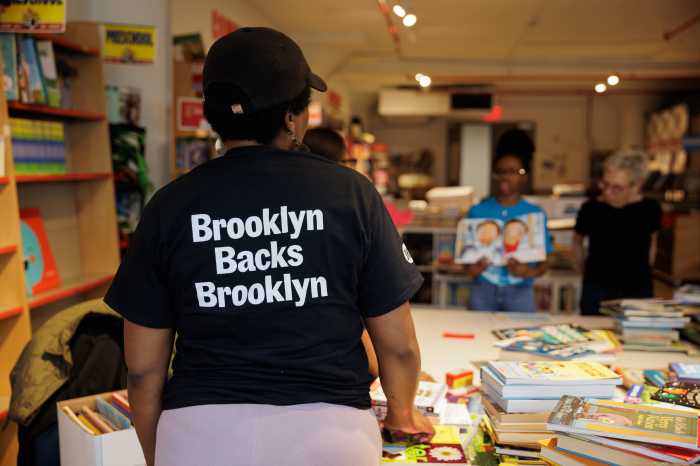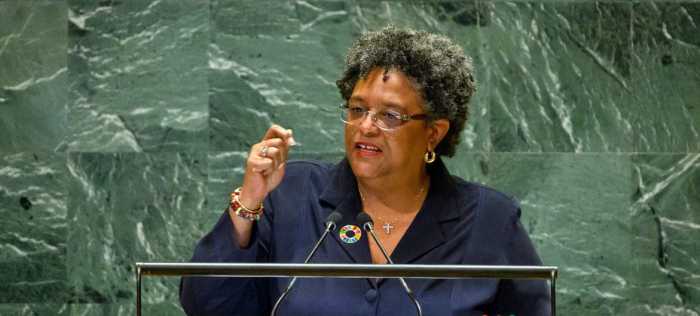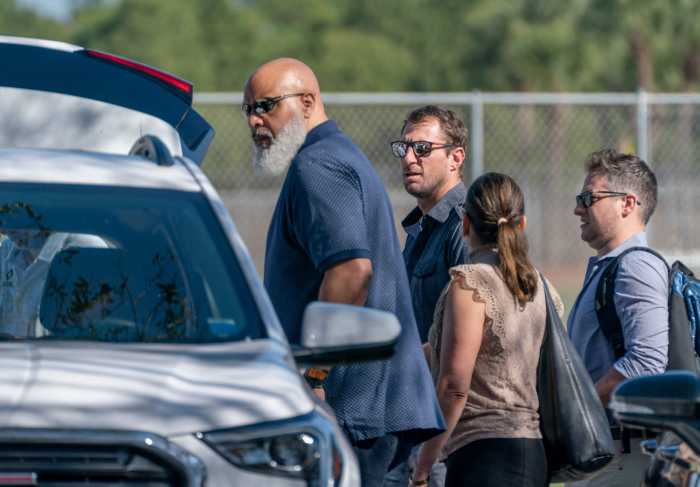BY ANDY HUMM | The St. Patrick’s Day Parade in Manhattan marks its 250th anniversary this year and its 20th excluding Irish gay groups from marching.
While a gay-inclusive St. Patrick’s Day Parade was held for the 12th time in Queens on March 6, an enormous controversy has arisen over the Staten Island St. Patrick’s Day Parade’s alleged exclusion of gay groups — an issue dividing some gay elected officials. And Gay City News has learned that several of the St. Patrick’s Day parades that discriminate against gay groups are getting city money.
To protest their continued exclusion from the Manhattan parade, the group Irish Queers will demonstrate along the route on March 17 on the west side of Fifth Avenue and 56th Street from 11 a.m. to 1 p.m. and is calling on Police Commissioner Ray Kelly, a former parade grand marshal, to stop letting police and others in the uniformed city services march in uniform.
Queens hosts open parade, while uniforms, Staten Island event, city funding raise questions
“The parade is explicitly anti-gay and religious in its message,” wrote Emmaia Gelman of Irish Queers in asking the group’s supporters to sign on to a letter to Kelly. Their uniformed presence, she wrote, makes “it clear to LGBT communities that the police accept and endorse this discriminatory event.”
Gay civil libertarian Bill Dobbs went further, saying that when police march in uniform in any kind of private parade, “it diminishes public confidence in the impartiality of the police department.” He has no issue with individual officers marching and identifying themselves with signs or banners.
Kelly, who was grand marshal last year, made his first appearance in the inclusive Queens parade this year. Several politicians, including then-Senate candidate Hillary Clinton in 2000 and Mayor Michael Bloomberg in most years, try to offset the negatives of participating in the anti-gay Manhattan parade by also showing up for the Queens event organized by veteran gay and Irish activist Brendan Fay and Kathleen Walsh D’Arcy. The Queens parade, which travels from Sunnyside to Woodside, includes groups from the LGBT and Irish communities, not to mention the Sunnyside United Dog Society.
Kelly was asked by Gay City News if he supported including LGBT groups in St. Patrick’s Day parades, and he said, “Ideally, everybody should be able to go everywhere.” However, asked if police marching in uniform in a parade that excludes LGBT groups sends a bad signal, he said, “You have to look at the history of the parade over 250 years,” and would not engage on the issue.
Out lesbian City Council Speaker Christine Quinn also deflected questions about the participation of uniformed police in discriminatory parades.
The speaker held a press conference prior to stepping off in the Queens parade to announce she would not march in the Richmond County St. Patrick’s Day Parade because it rejected the application of Staten Island Pride Events (SIPE) to march. She released her letter to Jim Haynes of the Richmond parade committee decrying the different standard that SIPE was being held to. The letter said SIPE was told “the parade is considered a religious parade and holding an LGBT banner would not be in line with the nature of the parade.”
At the press conference, held in Councilman Jimmy Van Bramer’s district office, Quinn pledged to boycott the Staten Island parade, a message echoed by Comptroller John Liu, Public Advocate Bill de Blasio, and Manhattan Borough President Scott Stringer. Quinn, Liu, de Blasio, and Stringer are all contemplating a run for mayor in 2013, as is Kelly.
Given that the Fifth Avenue parade also openly discriminates against LGBT groups, Gay City News asked Quinn if it was appropriate for police and firefighters to march in uniform in them. “I think those kinds of issues have been looked at in the courts,” she said. “It is every individual’s personal decision. The blame ends with the organizers. It is not my job to judge other people. Not going to judge any police officer or firefighter. They would take a bullet for a gay person. The organizers put people in a terrible situation.”
Pressed about what kind of signal it sent for city employees to march in uniform in the Fifth Avenue parade: “That’s been litigated. The city doesn’t have the right to tell people” whether they can march in uniform.
While the right of parade committees to exclude whomever they want has been litigated all the way to the Supreme Court in a Boston case, there is no civil right to march in uniform. Officers who march are off-duty, and cops and firefighters found they could be disciplined for off-duty public conduct when Mayor Rudy Giuliani fired some for participating in a 1998 Broad Channel, Queens Labor Day parade in blackface.
City Funds for Anti-Gay Parades
Those parades that are exclusionary have argued they are private, religious events. But it has come to light that several have been receiving city funds, which ought to obligate them to abide by the New York City human rights laws that bar discrimination based on sexual orientation and gender identity and expression.
The Richmond County parade got $2,500 from Councilwoman Debi Rose’s member item allocation and apparently more from the Staten Island borough president’s office. The Bay Ridge St. Patrick’s Day Parade Committee gets $2,000. And the Throggs Neck Benevolent Association, which runs the St. Patrick’s parade there, got $5,000 from Councilman James Vacca.
In 1999, Quinn was arrested protesting anti-gay discrimination by the Throggs Neck parade, along with State Senator Tom Duane and Fay. But asked if discriminatory groups weren’t barred from receiving city funds, Quinn’s response via email read, “As we look towards the FY2012 budget, all groups receiving discretionary funding from individual Council members will be under review for further funding.”
Comptroller Liu’s office refused to respond to repeated inquiries about the appropriateness of this funding.
Quinn and others have repeatedly defended city funding for social service groups affiliated with anti-gay religions such as Catholicism and Orthodox Judaism by insisting that it is not direct funding for the religion itself and that providers must abide by anti-discrimination laws in providing services.
The Staten Island Dispute
On Staten Island, out gay State Assemblyman Matt Titone, who has marched in the St. Patrick’s parade in his district since 2006, wants to give parade organizers the benefit of the doubt on charges they are discriminatory. He said the application from Staten Island Pride Events (SIPE) was made by “one individual,” Gerard Mawn, and that others in SIPE “told him not to do it.” But the SIPE members contacted by Gay City News from a list provided by Titone’s office refused to comment for the record.
Titone said he advised Quinn, Liu, and de Blasio to join him in the Staten Island parade. “They made a rash decision and a huge mistake,” he said. He also said that Quinn’s office assured him she would not do a press conference or a public letter on the dispute, and that he only learned she had when he was pulled out of the Staten Island parade by a reporter to give a reaction to the boycott by the city officials.
“The gay community of Manhattan is not going to dictate to the activists of Staten Island,” Titone said, not specifying whom he was referring to.
Quinn responded to Titone’s charges in a email, writing, “My staff spoke to parade organizers and groups who wanted to march with their banners and flags. After confirming the organizers exclusion of LGBT marchers who wanted to carry banners and flags, my staff informed the Assemblymember and other elected officials that I was not marching and that I would release a statement explaining my decision not to march.”
Mawn said he was inspired to apply to march in the St. Patrick’s parade by the success SIPE and the Staten Island LGBT Center had marching in the Columbus Day parade there in October. (No LGBT group seems to have ever tried to march in the Manhattan Columbus Day parade.)
Mawn, who said Titone should not have marched in the St. Patrick’s Day parade once SIPE’s application was rejected, provided Gay City News with email evidence that he worked with other Staten Island activists in his effort to join the parade and abided by all of the registration requirements laid down by the Ancient Order of Hibernians, only to be rejected.
Young Democrats of Staten Island did march in the parade there and wore small rainbow lapel pins in solidarity with the excluded LGBT group. Parade marshal Dennis McKeon tried to forcibly remove one of the group’s African-American members, St. Jermaine Endeley, from the parade and monitored the Young Democrats throughout to make sure they did not unfurl a gay banner, the Staten Island Advance reported.
Groups that are not Irish-specific were allowed in the Staten Island parade from the local Tea Party to the Bassett Hound Club.
Neither Jim Haynes III nor Brooklyn Supreme Court Judge Michael Brennan of the Hibernians returned calls for comment on exactly what the official policy of the parade is on letting gay groups in, though Mawn and Quinn said they were told gay groups were not allowed. Haynes told the Advance, “the group would look into the possibility of relaxing the restriction ‚Äòin the near future.’”
An Advance, editorial called for “a reasonable compromise” on the issue. Gay groups across the city, meanwhile, are seeking to march under the same standard as other groups, with identifying banners, not rainbow pins or sashes. Even pins or sashes have been rejected by the Hibernians in Manhattan, despite Quinn’s efforts to broker such a compromise.
Fay said that Mawn has accomplished what no other gay group has — meeting with the Hibernians to discuss the dispute, even if he was rejected.
Boston Compromise
Mayor David Dinkins distinguished himself in 1991 when he invited members of the Irish Lesbian and Gay Organization to march alongside him, but without their banner. Even so, their presence was met with jeering spectators, one of whom threw a beer can at the mayor. After that, Irish gay groups sought to stage an inclusive parade just prior to the Hibernians’ event, but were denied by the police department, then as now led by Kelly. The NYPD said the city couldn’t handle two parades on one day, though they have and do. The courts sided with Kelly in the dispute.
This year in Boston, where the Hibernians won a US Supreme Court case 16 years ago giving them the legal right to keep gays out of their parade, the city is accommodating another parade, this one led by Veterans for Peace, which will allow gay groups to join them.
At the Queens parade, Quinn told the crowd, “I know that very soon Forest Boulevard [on Staten Island] and Fifth Avenue and every avenue in the City of New York will have the same groups that Skillman Avenue [in Queens] does. “ She added, “Every street in this city is for everyone.”


































